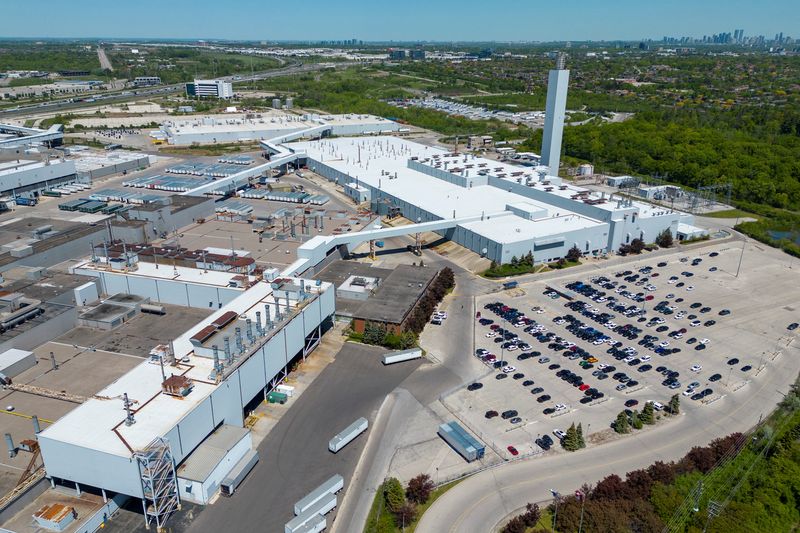By Nora Eckert and Nathan Gomes
DETROIT (Reuters) -Ford Motor on Thursday outlined plans to use a Canadian plant it had earmarked for a future electric vehicle to instead build larger, gasoline-powered versions of its flagship F-Series pickup truck.
Ford in April had already delayed the launch of the planned three-row electric SUVs at its Oakville Assembly facility from 2025 to 2027, citing slower than expected growth in EV demand. It said on Thursday it remained committed to those EVs and that timeline but did not say where they would now be built.
The Dearborn, Michigan-based automaker plans to add capacity for 100,000 F-Series Super Duty trucks at the facility, including the ability to use what the company called "future multi-energy technology."
“Super Duty is a vital tool for businesses and people around the world and, even with our Kentucky Truck Plant and Ohio Assembly Plant running flat out, we can’t meet the demand," Ford CEO Jim Farley said in a statement. “At the same time, we look forward to introducing three-row electric utility vehicles."
Growth in EV demand globally has slowed, causing market leaders like Tesla (NASDAQ:TSLA) and BYD (SZ:002594) to cut prices to stimulate sales, and legacy automakers like Ford and General Motors (NYSE:GM) to pull back on many of their lofty battery-powered goals.
Ford, which lost nearly $4.7 billion on its EV business in 2023 and has projected it will lose up to $5.5 billion this year, said in February the next generation of EVs would be launched "only when they can be profitable."
GM on Monday declined to reiterate its previously announced forecast that it would have 1 million units of electric vehicle production capacity in North America by the end of 2025. Legacy automakers continue to benefit from long established factories for their gas-powered vehicles, making them more profitable than their EV models, said Sam Fiorani, vice president at research firm AutoForecast Solutions.
Ford has increasingly leaned into production of hybrid vehicles to win over consumers who aren't ready to go fully electric. The automaker aims to quadruple hybrid production over the next few years.
These lucrative F-150 heavy-duty trucks, which are especially popular for the automaker's commercial business, are also produced at assembly plants in Kentucky and Ohio.
The company plans to invest about $3 billion to expand Super Duty production, including $2.3 billion to install assembly and integrated stamping operations at the Oakville Assembly Complex.
The expansion will initially secure approximately 1,800 jobs at Oakville, Ford said, and result in the addition of about 220 jobs at engine and component plants after that.
Canadian automotive union Unifor was relieved to hear Ford plans to ramp up production at the assembly complex ahead of schedule.
“This new retooling plan for the Oakville plant addresses our union’s concerns with Ford Motor (NYSE:F) Co’s decision to delay new vehicle production for a period that was too long, too disruptive, and too harmful to accept,” Unifor National President Lana Payne said in a statement.

Ford's commercial business has been a profit engine, especially as the automaker burns cash on EV production and development. The company is betting on software-related services in its commercial division to drive profits in the coming years. The unit had operating profit margins of almost 17% last quarter.
Ford and GM are scheduled to release second-quarter results next week.